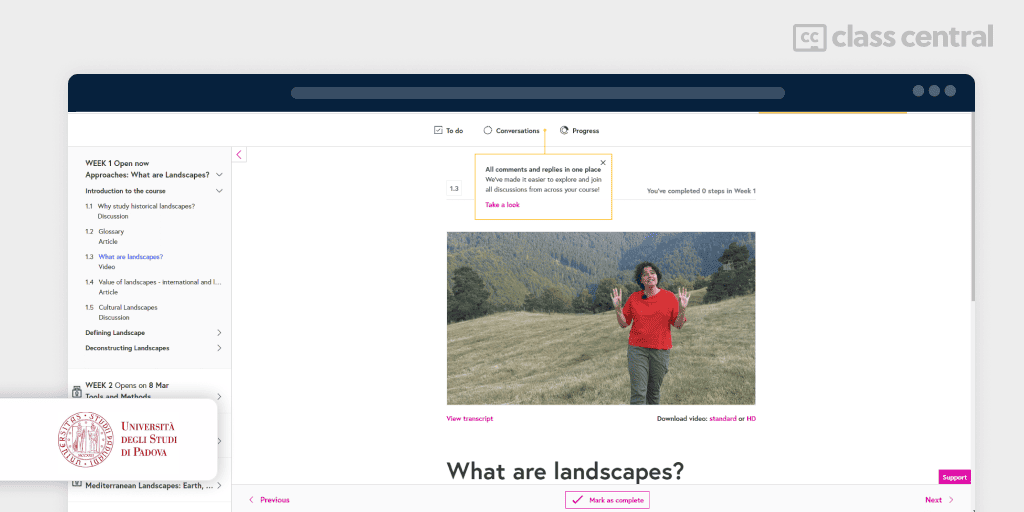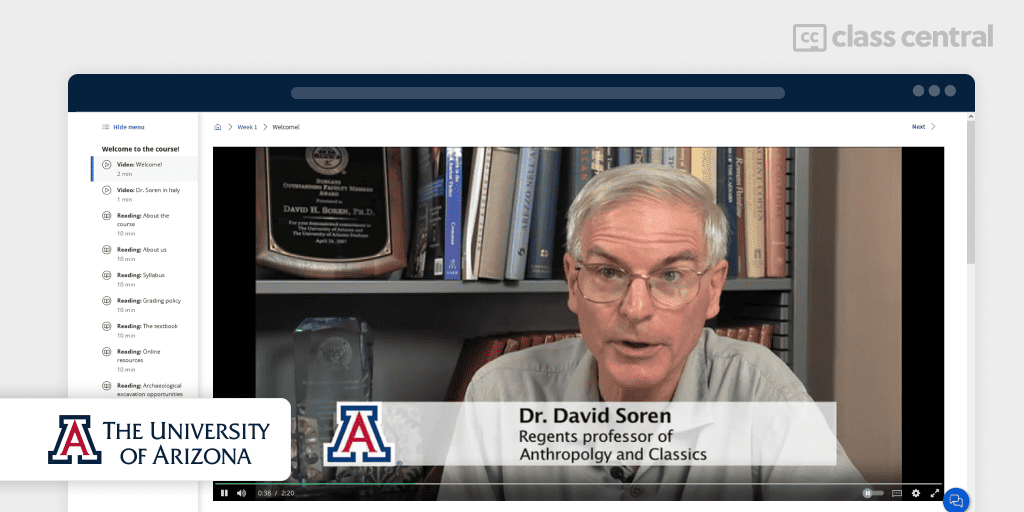9 Best Free Archaeology Courses for 2025: Digging up the Past
Are you fascinated by past human activities? Learn archaeological techniques for the field and the lab, then explore some ancient civilizations and regions.
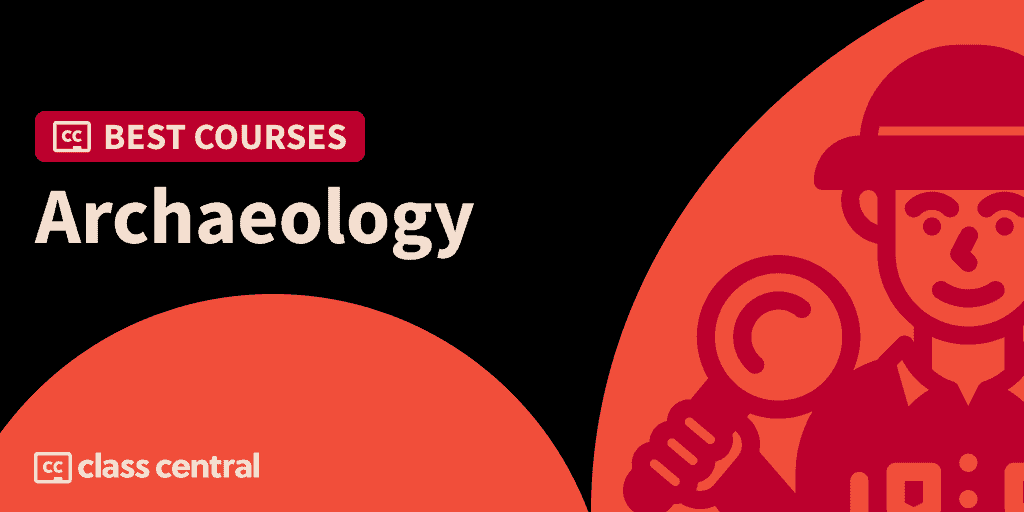
Back in 2012, I discovered free online courses and a new hobby was born. The twentieth course I completed (in mid 2014) was Archaeology’s Dirty Little Secrets which, sadly, is no longer available. That top-notch course sparked my interest in archeology and also fanned the fire of my obsession with online learning. I finished the course and immediately enrolled in six more courses, which turned out to be an impossible workload in the days when online courses followed strict weekly schedules and deadlines.
Although I’m no Indiana Jones, I’ve taken several online archaeology courses since then. For this Best Courses Guide (BCG), I combed the Class Central catalog and collated ratings and reviews to identify the top courses on various aspects of archaeology. All of the courses are suitable for beginners, with enough material to also be interesting for intermediate learners. And best of all, they’re all either free or can be audited for free.
Click on the shortcuts for more details:
- Top Picks
- What is Archaeology?
- BCG Stats
- Why You Should Trust Us
- How We Made Our Picks and Tested Them
Here are our top picks
Click on one to skip to the course details:
What is Archaeology?
Archaeology is the study of human history and prehistory through the excavation and analysis of artifacts, structures, and other physical remains. Archaeologists seek to understand past human cultures, societies, and behaviors by examining and interpreting material remains, such as pottery, tools, bones, and structures, that have been preserved in the archaeological record. This field of study helps reconstruct and comprehend the development, practices, and lifestyles of ancient civilizations and societies. Archaeology generally involves careful excavation, documentation, and analysis of archaeological sites
According to Wikipedia, archaeology is considered to be a branch of anthropology in North America and Asia, while in Europe, it’s viewed as a separate discipline or related to history and paleontology.
BCG Stats
- All courses are free or free to audit
- 7 courses offer a certificate of completion
- The Archaeology subject is followed by 3.2K learners on Class Central
- The most featured provider is FutureLearn with 4 courses.
- Best General Archaeology Course (Archaeosoup)
Best General Archaeology Course (Archaeosoup)
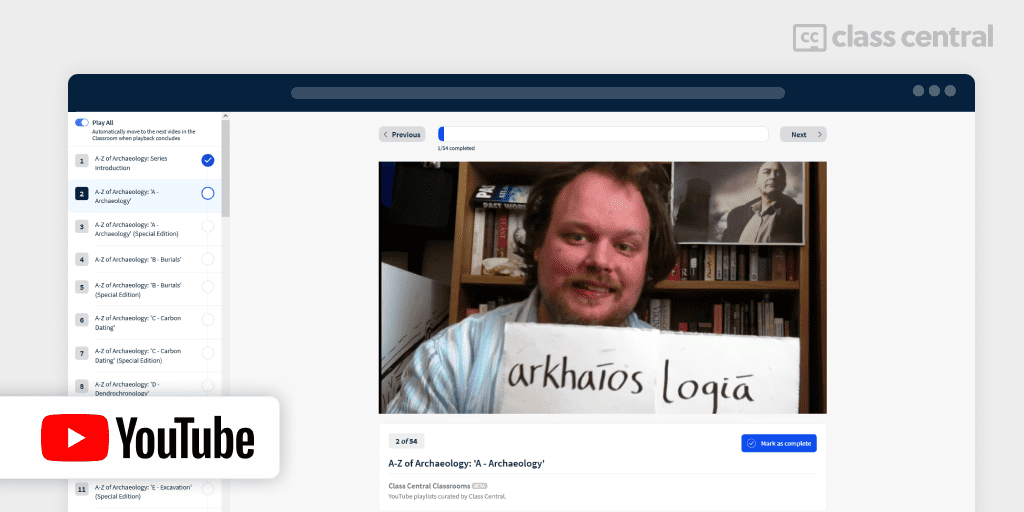
A-Z of Archaeology is a thorough exploration, designed to cover methodologies, tools, and theoretical frameworks of archaeology. Each letter of the alphabet introduces a new topic, from ‘A – Archaeology’ to ‘Z – Zat’s All Folks!’’, making learning both engaging and systematic. This course offers a broad overview of archaeological practices, valuable knowledge, and perspectives for students considering a career in archaeology, history buffs, or anyone simply curious about the past.
Note: while this is a great look at many aspects of archaeology, you may want to skip every second video in the playlist and stick to the Special Edition videos. These repeat the information in the others, with additional insights added.
You will gain:
- A broad understanding of archaeological practices, from excavation techniques to carbon dating
- Insights into the significance of archaeological findings, including burials, material culture, and landscape archaeology
- Knowledge of specialized topics such as dendrochronology, geophysics, and underwater archaeology
- Awareness of the challenges in archaeology, including the illegal trade of artifacts and pseudo-archaeology.
Archaeosoup has produced many videos and playlists including:
- Aspects of Archaeology (4-5 hours)
- Forensic Archaeology and Anthropology MOOC Support Videos (30 mins)
- Introduction to Ancient Greece (30 mins)
| Provider | YouTube |
| Channel | Archaeosoup |
| Time Commitment | 3-6 hours |
| Views | 24.2K |
| Cost | Free |
| Certificate | Not available |
Best Explanations of Archaeological Dating (Dig It With Raven)
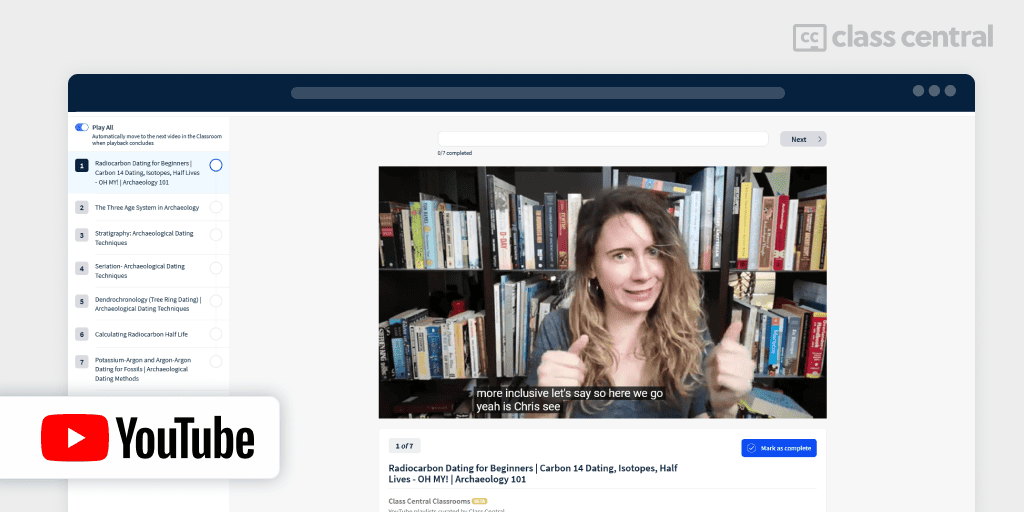
If you’ve ever wondered how archaeologists estimate and calculate the age of artifacts and cultures, wonder no more! Archaeological Dating Methods is an essential guide for anyone interested in understanding the various techniques used to date archaeological artifacts and sites, providing you with a comprehensive overview of how they are applied.
The course stands out by offering a blend of theoretical knowledge and practical insights, making it a unique learning opportunity for those fascinated by the past.
This course will teach you:
- Understanding of various archaeological dating techniques, including radiocarbon and potassium-argon dating, stratigraphy, seriation, and dendrochronology
- Knowledge of how to apply different dating methods to archaeological artifacts and sites
- Insights into the principles behind isotopes, half-lives, and the Three Age System in archaeology
- The ability to comprehend and calculate radiocarbon half-life for dating purposes.
Find more resources on the Dig it With Raven website.
“When I decided to major in archaeology I was not expecting all the chemistry involved. Thank you for making it easier to understand!” – @indiabee8073, YouTube learner.
| Provider | YouTube |
| Channel | Dig It With Raven |
| Time Commitment | <1 hour |
| Views | 5.1K |
| Cost | Free |
| Certificate | Not available |
Best Course About the Process of Archaeology (University of Reading)
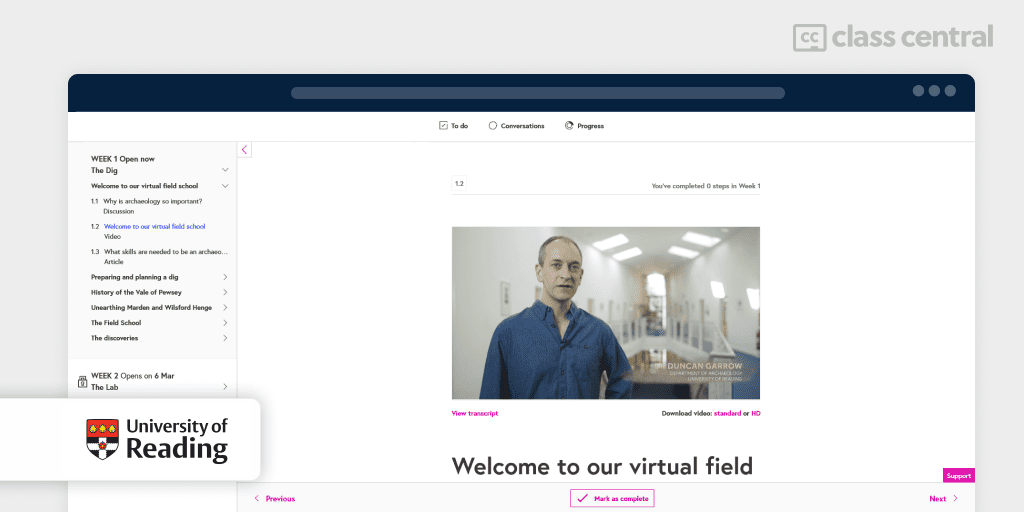
Archaeology: from Dig to Lab and Beyond is a captivating course offered by the University of Reading that takes you on a journey from the excitement of an archaeological dig to the meticulous analysis in the lab and beyond. Ideal for those with no prior experience in archaeology, this course is perfect for anyone considering a degree in archaeology or just has a keen interest in uncovering the mysteries of the past.
Over two weeks, you’ll explore the Vale of Pewsey to uncover the stories of ancient lives. This course not only demystifies the process of archaeological excavation but also highlights the importance of preserving history through careful study and conservation.
What you’ll learn:
- The entire process of an archaeological excavation, from planning to digging
- Techniques for collecting, recording, and storing archaeological finds
- Methods for analyzing discoveries, particularly skeletal remains, to deduce historical lifestyles, health, and occupations
- Insights into the history and significance of the Vale of Pewsey and its comparison to Stonehenge.
“Excellent course for anyone looking to learn more about archeology. Things are very well explained…” – Isidora Dumitrov, Class Central learner.
| Provider | FutureLearn |
| University | University of Reading |
| Instructors | Duncan Garrow, Mary Lewis, Amanda Clarke |
| Time Commitment | 6 hours |
| Enrollment | 56.0K |
| Rating | 4.8 (526) |
| Cost | Free audit |
| Certificate | Paid |
Best Course on Landscape Archaeology (University of Padova)
Did you know an experienced archaeologist can look at the shape of a landscape and draw conclusions about land use in times past?
Historic Landscape Archaeology: Approaches, Methods and Beneficiaries is a four-week exploration into the rich field of landscape archaeology. Designed for anyone with an interest in historic landscapes, this course is especially beneficial for professionals in archaeology, museum conservation, education, and tourism management, highlighting the real beneficiaries of landscape archaeology.
By the end of this course, you’ll have a deeper understanding of how to identify, study, and manage historic landscapes, equipped with knowledge on various methodologies and the significance of landscape archaeology in today’s rapidly changing world.
You’ll learn about:
- The history, definition, and politics of landscapes, and the international institutions that protect them
- A variety of methodologies in landscape archaeology, including reading ancient maps, remote sensing techniques, excavation, and environmental analysis
- How to analyze soil, plants, and zoological remains to reconstruct environmental changes
- The significance of earth, water, and fire in understanding past and present landscapes
- Strategies for involving local communities in land-use planning and conservation efforts.
Other highly-rated courses from the University of Padova include:
- Enlightening the Dark Ages: Early Medieval Archaeology in Italy (12 hours)
- Change of Era: The Origins of Christian Culture through the Lens of Archaeology (20 hours)
“Excellent selection of tools and contents, which facilitate a very complete learning in an enjoyable way…” – Anonymous, Class Central learner.
| Provider | FutureLearn |
| University | University of Padova |
| Instructor | Alexandra Chavarria, Tamara Lewit |
| Time Commitment | 16 hours |
| Enrollment | 1.1K |
| Rating | 4.6 (54) |
| Cost | Free audit |
| Certificate | Paid |
Best Remote Sensing Archaeology Course (Durham University)
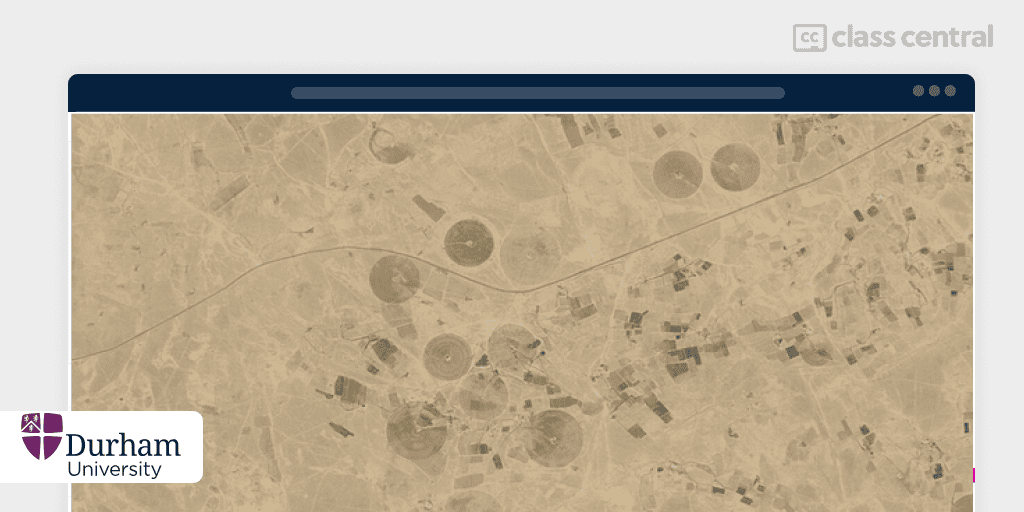
Many archaeological sites are vulnerable to damage from agriculture, mining, and infrastructure. Endangered Archaeology: Using Remote Sensing to Protect Cultural Heritage introduces remote sensing techniques to identify, document, and monitor at-risk archaeological sites. Learn to interpret satellite imagery, assess site conditions, and create basic maps to communicate findings—essential skills for heritage preservation in threatened regions.
What you’ll learn:
- Introduction to satellite remote sensing in archaeology
- Using Google Earth Pro to access and analyze satellite imagery
- Image interpretation – identifying archaeological sites and features
- Assessing damage and threats to heritage sites
- Case studies – mud and stone landscapes across the Middle East and North Africa
- How to create and share maps to communicate archaeological information.
More archaeology courses from Durham University:
- Advanced Archaeological Remote Sensing: Site Prospection, Landscape Archaeology and Heritage Protection in the Middle East and North Africa (18 hours)
- Archaeology and the Battle of Dunbar 1650: From the Scottish Battlefield to the New World (12 hours)
“Each week built nicely upon the last—from interpreting satellite images and identifying features to understanding different site types and detecting damage. I am genuinely happy with what I have learned. ” – DIGITAL B., FutureLearn learner.
| Provider | FutureLearn |
| University | Durham University |
| Instructors | Sean Pryor |
| Time Commitment | 18 hours |
| Enrollment | 5.8K |
| Rating | 4.8 (61) |
| Cost | Free audit |
| Certificate | Free |
Best Stone Age Archaeology Course (University of York)
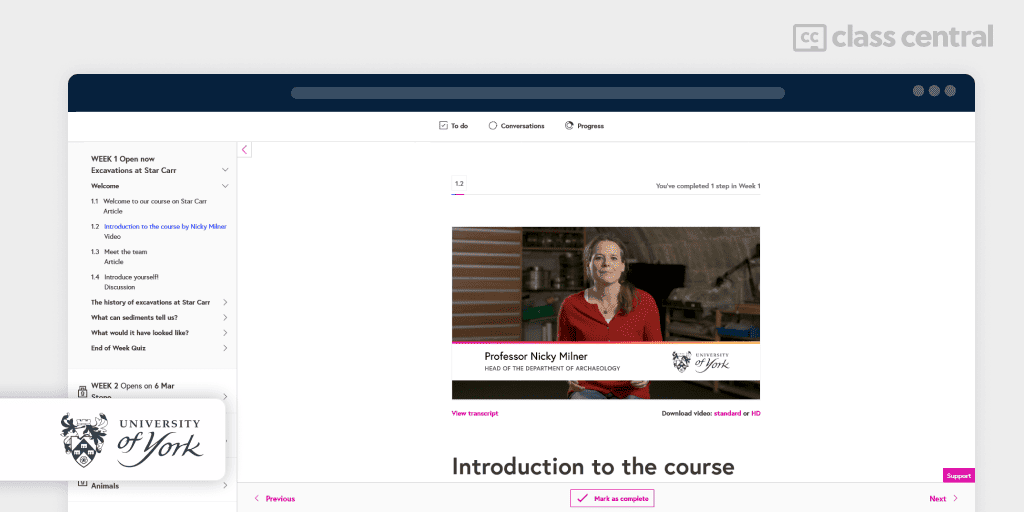
Explore the incredible discoveries at one of Britain’s most significant archaeological sites with Exploring Stone Age Archaeology: The Mysteries of Star Carr. Through an engaging syllabus that covers the history of excavations, you’ll gain insights into life over 10,000 years ago, even if you have no prior background in archaeology. The course is comprehensive in its exploration of how these findings contribute to our understanding of human history, making it perfect for those considering higher education in archaeology or related fields.
You’ll gain:
- An understanding of the significance of Star Carr in British archaeology
- Knowledge of ancient artifacts, including stone tools and the oldest complete bow
- Insights into the earliest evidence of carpentry in Europe and the construction of the oldest known house in Britain
- An appreciation for the role of sediments in archaeological discoveries
- A foundational understanding of archaeology for those considering further study in the field.
“Excellent and very informative course. Each chapter had extra material to work with…” – Isidora Dumitrov, Class Central learner.
| Provider | FutureLearn |
| University | University of York |
| Instructor | Nicky Milner, Andy Needham, Steph Piper, Becky Knight |
| Time Commitment | 16 hours |
| Enrollment | 15.0K |
| Rating | 4.7 (644) |
| Cost | Free audit |
| Certificate | Paid |
Best Egyptian Archaeology Course (Harvard University)
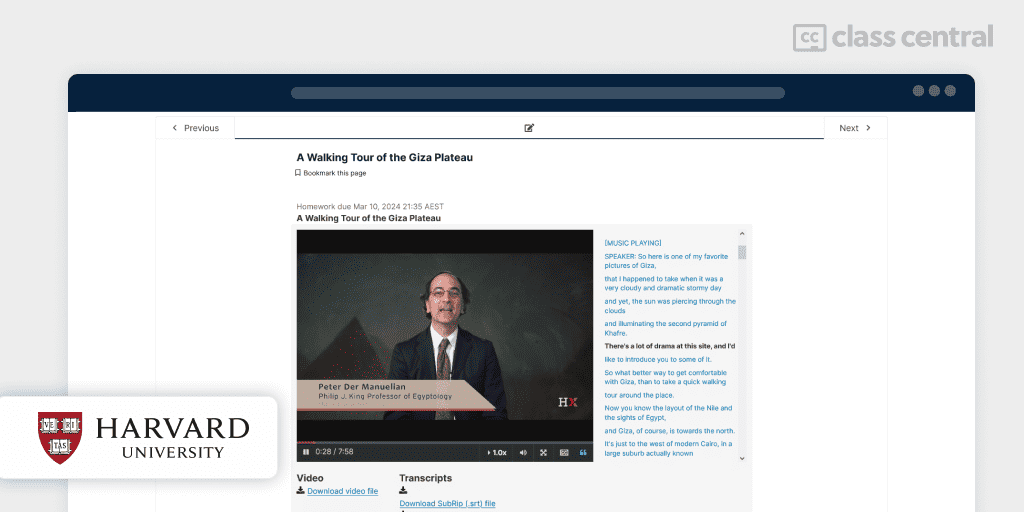
Explore ancient Egyptian civilization through the lens of the Giza Plateau, home to the iconic Pyramids and the Great Sphinx with Pyramids of Giza: Ancient Egyptian Art and Archaeology. Enthusiasts of history, archaeology, and ancient cultures will delve into the art, archaeology, and history of the Giza Pyramids.
The course also highlights the evolution of archaeology, showcasing how 3D modeling and other modern technologies are revolutionizing Egyptology. Participants will also learn about the pioneering expeditions of the 20th century that brought these sites to the forefront of historical study. This course is a unique opportunity to engage with Harvard University’s rich educational resources and the extensive knowledge of instructors experienced in the field of Egyptology.
From this course, you’ll gain:
- An understanding of the Giza Plateau’s role in ancient Egyptian civilization
- Knowledge of the construction, history, and cultural significance of the Pyramids and the Great Sphinx
- Insights into the lives of Egyptian pharaohs and officials during the Pyramid Age
- An overview of the history of archaeology and the impact of modern digital tools on the field.
“Excellent course! I enjoyed the professor, Dr. Peter Der Manuelian, for his knowledge, enthusiasm and humor. There were additional source readings from scholarly publications that I found especially enriching…” – Martha Solomon, Class Central learner.
| Provider | edX |
| University | Harvard University |
| Instructor | Peter Der Manuelian |
| Time Commitment | 16-32 hours |
| Enrollment | 183.9K |
| Rating | 4.8 (67) |
| Cost | Free audit |
| Certificate | Paid |
Best Roman Archaeology Course (University of Arizona)
Roman Art and Archaeology covers a timeline from about 1000 BCE to the so-called “Fall of Rome”. It’s designed for anyone interested in understanding the evolution of Roman culture. David Soren brings a wealth of knowledge and experience in Roman history, ensuring an informative and engaging learning experience.
What you’ll gain from this course:
- A thorough understanding of the cultural evolution of ancient Rome from its early days to its decline
- Insights into the key figures and events that shaped Roman history
- Knowledge of Rome’s expansion and its influence on art, architecture, and cultures across the Mediterranean and beyond
- An appreciation for the legacy of Roman civilization and its impact on the modern world.
“If you want to know about history, art and archaeology of Roman from the beginning till the end, this course is suit for you…” – Yanisa Lertsirimunkong, Class Central learner
| Provider | Coursera |
| University | University of Arizona |
| Instructor | David Soren |
| Time Commitment | 23 hours |
| Enrollment | 54.1K |
| Rating | 4.7 (621) |
| Cost | Free audit |
| Certificate | Paid |
Best African Archaeology Course (Universitat Autònoma de Barcelona)

Archaeology and Heritage of Africa, offered by the Universitat Autònoma de Barcelona in collaboration with the German Archaeological Institute and other global partners, is a deep dive into the archaeology and heritage of Africa. It covers the continent’s rich cultural heritage, from the earliest hominin fossils to ancient civilizations.
With contributions from worldwide experts, you will explore new archaeological methods and gain insights directly from researchers working on the continent. This course is perfect for those looking to understand the diverse heritage of Africa and modern approaches to its study and preservation.
You’ll gain:
- A comprehensive understanding of African archaeology and its unique aspects
- Knowledge of new archaeological methods and interdisciplinary research approaches
- Insights into heritage management and the use of heritage for local development
- Direct learning from case studies in Mozambique, Chad, Namibia, and the West African Savanna
- An appreciation for the role of local communities in the preservation and protection of heritage sites.
“it was an amazing experience, intensive knowledge with wider perspective” – Nandita, Coursera learner.
| Provider | Coursera |
| Institution | Universitat Autònoma de Barcelona (Autonomous University of Barcelona) |
| Instructor | Sofia Fonseca and Jörg Linstädter |
| Time Commitment | 17 hours |
| Rating | 4.7 (25) |
| Enrollments | 2.2K |
| Cost | Free audit |
| Certificate | Paid |
Why You Should Trust Us
Class Central, a Tripadvisor for online education, has helped 100 million learners find their next course. We’ve been exploring online education for more than a decade to aggregate a catalog of 250,000 online courses and 250,000+ reviews written by our users. And we’re online learners ourselves: combined, the Class Central team has completed over 400 online courses, including online degrees. I’ve personally completed over 200 online courses in a variety of topics including archaeology.
How We Made Our Picks and Tested Them
Trying to find “the best” can be daunting, even for those of us who live and breathe online courses. Here’s how I approached this task.
First, I combed through Class Central’s Catalog and the internet to find a variety of free and paid open courses, some with certificates. You don’t need to enroll in a university to learn about archaeology.
When choosing courses, I considered the following factors:
- Course content: I examined courses that covered a range of topics and presentation styles, including the basics and more advanced topics. I watched some course videos to sample courses I hadn’t already taken
- Renowned Institutions: I looked for recognized institutions in archaeology
- Instructor experience: I sought instructors with extensive experience in archaeology and engaging presentation styles
- Popularity: I checked numbers of enrollments and views to find popular courses
- Learner reviews: I read learner reviews (when available) to get a sense of the quality of each course, leveraging the Class Central database with its thousands of course ratings and reviews written by our users as well as available course provider reviews.
Then, I defined the scope for these recommendations. An archaeology course can cover various topics, so I chose top courses from a range of sub-fields.
Ultimately, I used a combination of data and my own judgment to make these picks. I’m confident these recommendations will be a reliable way to learn about archaeology.


